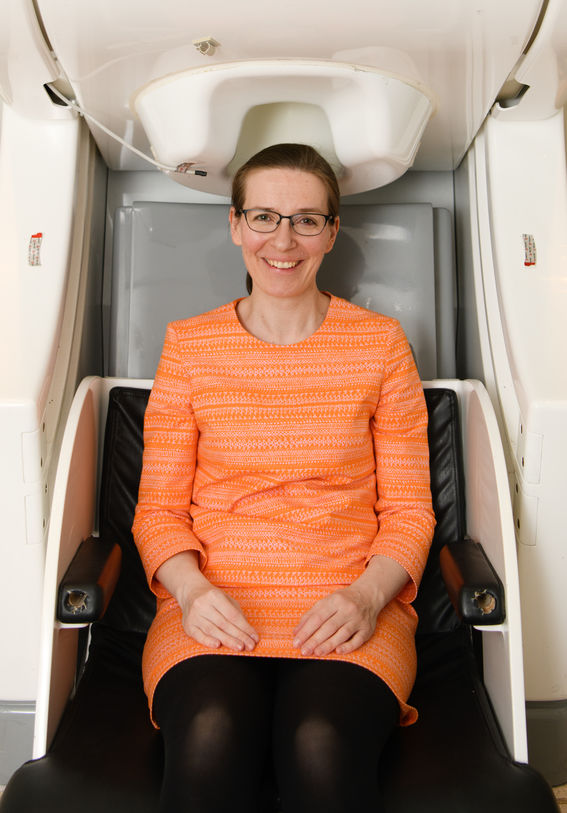Hanna Renvall: Being a professor and working in the emergency room at the same time teaches ‘what kinds of questions our research should seek to answer’

What do you study and why?
I study healthy and diseased brains using functional neuroimaging to enable us to use healthy brains to better understand diseased ones, and to use sick brains to better understand healthy ones. I am especially interested in brain functions linked with the processing of language. For example, linguistic disorders suffered by stroke victims significantly lower their quality of life.
I seek to combine methodological developments with practical brain imaging to improve the accuracy and effectiveness of the measurements. Computational methods help in the interpretation of the results, especially when the data is challenging to collect. For example, we have succeeded, together with Professor Riitta Salmelin and Professor Sami Kaski, in identifying an individual in just a few seconds using magnetoencephalography (MEG) with the help of artificial intelligence. We call this a “brain fingerprint,” and we are now expanding this research to different kinds of patient data.
Together with Nina Forss, Adjunct Professor of neurology, we are developing diagnostics for traumatic brain injuries, seeking to use MEG to work out which patients with brain injuries need to be followed.
How did you get to be a professor or researcher?
When I was in upper secondary school, I saw a programme about brain research at the Low Temperature Laboratory at the Helsinki University of Technology, and I became extremely interested in the topic. I applied, and was accepted to study both medicine and medical technology, and after studying for a year I applied for a summer job with Professor Riitta Hari.
Throughout my studies, it was clear to me that I want to be a researcher. Research involves both responsibility and freedom. I can work like crazy for a week, followed by something quite different. I did not want to be limited to clinical work.
I wrote my doctoral dissertation on dyslexia together with Riitta Hari. We created a new theory on the background of dyslexia, and I defended my dissertation on the topic in 2004. Our dyslexia theory was long met with silence, but it is gradually being revisited after a break. It is now one of the strong theories concerning dyslexia, which has been quite inspiring.
I have encountered real people and real issues. I have managed to join projects at the right moment when it has been possible to achieve results and significance for this field of science. It has also helped me get my professorship.

What are the high points of your career?
My professorship is shared by HUS and Aalto. It is significant for the entire field, because it brings together one of Europe's biggest hospitals with the exceptional technical skills and knowledge of Aalto University. It is still part of my day-job to direct the HUS BioMag laboratory, which offers MEG diagnostics nationwide.
I am also often on duty at Haartman Hospital on Friday evenings. It is a world of its own and truly an interesting place. At the Emergency Department I learn what is important in work with patients and what kinds of questions our research should seek to answer.
I am actively involved in the world of choir singing. I am super-serious about my singing hobby and leading a choir. I founded the choir of the Department of Neuroscience and Biomedical Engineering at Aalto University, and in so doing I have also made good contacts at the scientific level. Many people in our department have found each other there. I am also the Deputy Director of the Philomea Choir.
What is the most important quality of a researcher?
In my view the most important quality is the ability to repeatedly feel enthusiasm about one's own research and that of others. The career of a researcher is not the easiest choice, because funding is hard to get and publishing is not easy. Although there are psychological blows to be endured, it is good to be capable of feeling inspiration again and again. I might still occasionally give a shout when I see great MEG curves.
What do you expect from the future?
I hope that the greatest scientific achievements might be yet to come. It is important to get to pass on skills and knowledge between HUS and Aalto. Aalto has exceptional technical skills, while at HUS it is possible to test the equipment with patients. Close cooperation can also enable great innovations.
With respect to funding, I hope for continuity; my research group now has one post-doctoral researcher and two doctoral students.
Further information:
Read more news

Significant donation to boost pavement engineering research and education
Companies and associations in the field have donated €400,000 to the School of Engineering.
Design strengthens industrial competitiveness – human-centered factory work at the core
Factory work is undergoing a transformation: new technologies and artificial intelligence are changing the content and roles of work. Aalto University’s Department of Design is studying this change from a human-centered perspective in the HiFive project.
Alum Ding Ma: 'I want to represent a new-era Mayor'
Ding Ma, who will start as the Mayor of Savonlinna at the age of 37, studied Information and Service Management at the School of Business.






